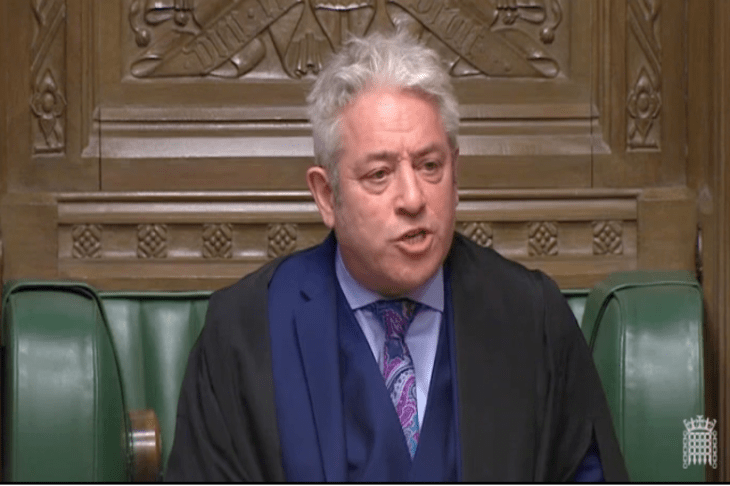John Bercow ditched Parliamentary precedent when he allowed a vote to take place on Dominic Grieve’s Brexit amendment yesterday. His decision caused uproar among Tory MPs, but Bercow defended the decision by saying that precedent didn’t count for everything when it comes to setting the rules in the Commons. He told MPs:
‘I am not in the business of invoking precedent, nor am I under any obligation to do so. I think the hon. Gentleman will know that it is the long-established practice of this House that the Speaker in the Chair makes judgments upon the selection of amendments and that those judgments are not questioned by Members of the House. I am clear in my mind that I have taken the right course of action.’
But has Bercow always taken that view? A quick glance at Hansard suggests otherwise. Here are eleven times the Speaker appeared to think differently about the importance of Parliamentary precedent:
I am as tightly bound by the Standing Orders of the House as the right hon. Gentleman is.…The Standing Orders are as they are for a reason, which is that they were drawn up for a purpose and they have been accepted by the House, and they do not admit of any discretion on my part. If I had discretion, no doubt I would exercise it, but I do not.
Very few things in this place are without precedent, and I certainly would not suggest that this situation is… I am not sure that even this situation, if uncorrected, would be unprecedented, but what I can say with some confidence is that such a circumstance is unusual and, indeed, in terms of the smooth running of the House and the existence of a basic atmosphere of trust between the usual channels, it is unhealthy for such situations to occur.
As will be evident to colleagues, many of these matters are proceeded with ordinarily on the basis not of statute, or even necessarily of a requirement of Standing Orders, but of convention and precedent. Those conventions and precedents are important to the collegiate operation of this House. They should not be tampered with or disregarded lightly.
We very much depend in this House, this institution, this great place, on conventions, precedent and a sense of respect for the will of the House.
The Standing Orders are of course our rules, and by those rules we must all abide.
I do not think that we will serve the House by interrupting the Queen’s Speech debate next Wednesday. I do not think there is a precedent for that, and it is not necessary.
The matter that the right hon. Gentleman raises is certainly important, but I am bound to tell him that it is treated of neither in “Erskine May”, which, of course, is the bible of parliamentary precedent and procedure, nor in Standing Orders.
In this place, we tend to be guided and governed to a considerable extent by precedent, and I simply make the point—I hope in a gentle, understated and courteous way—that following that precedent would seem to be sensible.
I am guided by and must operate within the Standing Orders of the House. I am not under the Standing Orders of the House so empowered.
May I gently say to the Secretary of State that I am witnessing something that is, in my experience in the Chair, unprecedented? The right hon. Gentleman must answer the questions that are put to him.
Even before John Bercow became Speaker, it seemed that precedent was important:
So what changed yesterday? Mr S. wouldn’t dare suggest that it has anything to do with Brexit…I am sorry to trouble my hon. Friend, but it is important to be guided by precedent, even if only by recent precedent.







Comments